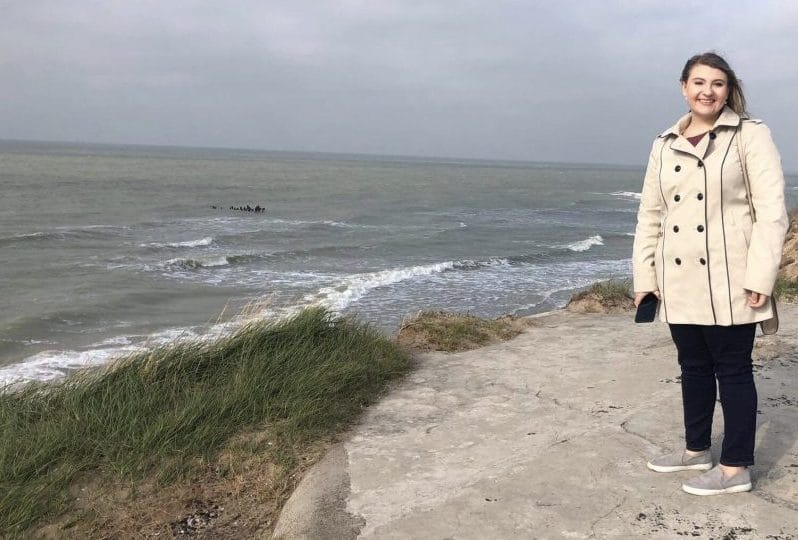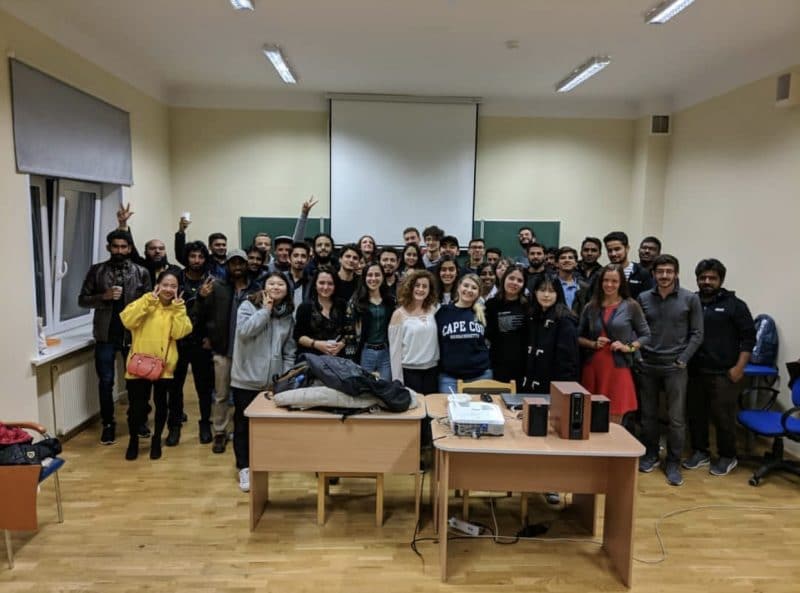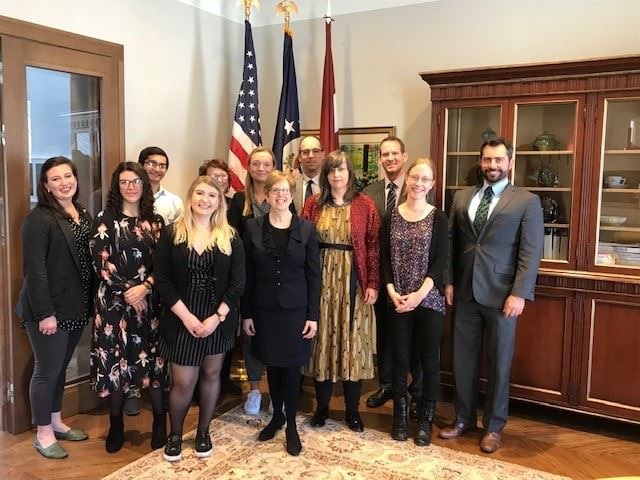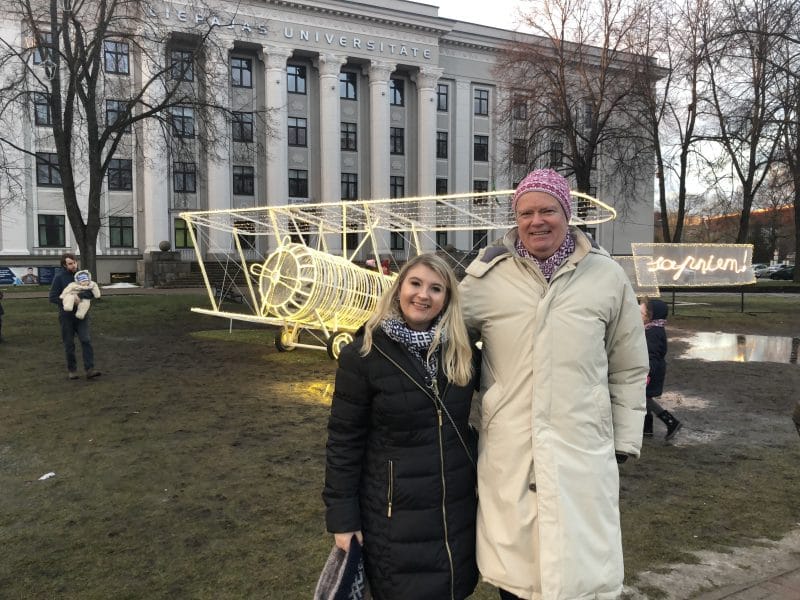
The Fulbright English Teaching Assistantship (ETA) places recent college graduates and young professionals from the United States in classrooms around the world to facilitate English teaching. The one-year fellowship, which has opportunities in over 70 countries, is designed to foster intercultural understanding and communication through an immersive cultural experience. In addition to their teaching roles, ETAs serve as ambassadors for the U.S., sharing their culture and forming relationships with residents of their host country.
We talked to Patricia Corey, a current Fulbright ETA in Liepāja, Latvia, to learn more about the program and get some application tips.
1. What inspired you to apply for the Fulbright ETA in Latvia?
In many ways, going to Latvia was a no-brainer because of my interests and exposure to Russian through my Latvian grandmother. It only made sense for me to experience her cultural journey in reverse, and the way to do would be by exchanging my English language skills for a once-in-a-lifetime opportunity to explore a culture I grew to love from my Latvian grandmother’s influence.
Besides my connection with my Latvian grandmother, my dream of going to Latvia to live truly began when I took a vacation in May 2017 to the capital of Latvia, Rīga. At the time, I was studying abroad in Moscow, Russia at the Russian State University for the Humanities during my junior year in college. I wanted a change of scenery, so I decided to go to Rīga to visit my grandmother’s home country and a couple of her friends, Modris and Ieva, who acted as my tour guides. Here, I completely fell in love with the country through visits to all of the churches and cathedrals, the art museums showcasing the most famous Latvian artists, the Latvian language, and most interestingly, the food! By the time I returned from seven months of studying abroad in Moscow, Russia, it was my senior year and I already knew I was going to apply for a Fulbright English Teaching Assistantship grant to Latvia. I had always thought about going to Latvia to live because of how my grandmother spoke about her home country, so I had already started taking Latvian language classes the summer before I went abroad to Moscow, just in case I decided I wanted to apply for the Fulbright ETA grant. Thankfully, my week-long Rīga get-away solidified my decision to apply for the to Latvia.
In addition, I realized during my sophomore year that I have a passion for learning about other cultures and languages that are different from my own and I like the challenge of understanding differences and creating mutual understanding. I was most excited about improving my Latvian and Russian skills and becoming more aware of the Latvian culture in terms of literature, films, and music, along with experiencing the joy of teaching English. I truly believe that mutual understanding starts with openness and the admiration and appreciation of culture and I hoped to bring that enthusiasm to Latvia to help me achieve these goals. Now, six months into my grant, I have never regretted my decision to apply for the program!

2. What have you enjoyed most about your fellowship so far?
I have most enjoyed bringing other people together from different cultures, experiences, and countries. My specific placement at Liepāja University asked me to continue an English Conversation Club that the previous Fulbrighter last year organized and facilitated. Last week, we had ten people from seven different countries show up to practice their English the group. We mostly playing speaking games such as Taboo, the 5-second rule, and Fight List. I try to make the English club as interactive and adventurous as possible so that people feel safe and valued speaking, while also challenging participants to improve their language skills. This is one of my favorite parts as a Fulbrighter because this work is incredibly important in fostering mutual understanding and achieving multicultural competency for myself and my fellow students at the university.
Additionally, I thoroughly enjoy teaching classes at the university level with both native Latvians and Erasmus/international students. More specifically, I love the written and oral communication course I teach because I enjoy teaching others how to write and express themselves in both academic and creative ways. I find there is always more of an emphasis on learning how to speak well, while the person’s writing skills are not as developed, so I also enjoy getting to help students match their writing skills with their speaking abilities. I get to contribute in their development as English speakers who are well-rounded, using the language both in person and on paper.
All-in-all, the benefits of this fellowship are so much more than being able to meet the U.S. Ambassador to Latvia, attending State Department sponsored conferences, or learning from and bonding with other Fulbrighters. Truly, it is a privileged opportunity to facilitate and begin a multi-cultural dialogue between people that would not normally interact. It’s an amazing feeling to see the people I bring together in the English club or my classes become good friends and have productive intellectual conversations about the world and what each of our countries is doing in it in relation to one another.

3. What tips would you give others applying to the Fulbright ETA in Latvia?
Certainly, the application process to receive a Fulbright ETA grant is extensive and long, but it should not deter anyone from applying. I believe the Fulbright Program is looking for applications that show a deep connection to their potential host country and who have both personal and professional goals to achieve on the grant. My application was successful because I breathed, slept, and ate thinking about myself in relation to Latvian life and culture as an English teacher and a person.
In this spirit, I tried to show who I am as a person and how I am as a teacher by explaining my personal and professional goals in my personal statement and statement of grant purpose, respectively. In my application, I attempted to show who I am as a person and as an educator by showing my future goals and positive personality traits through different stories that allowed Fulbright committees to connect with me. To write these essays, think of three traits of yourself as a person to hone in the personal statement and another three that exemplify yourself a teacher in the statement of grant purpose. On a technical level, this is how I approached these essays but my first step was introspectively thinking about who I am, what my interests are, and which host country could help me explore myself even more as a teacher and a cultural ambassador. My biggest piece of advice I can give anyone in applying is to start early, to discern your place in the host country, and reflect on what you want to achieve overall. I had a plan, purpose, and a passion to be in Latvia and that really helped my application to stand out.

Patricia Corey graduated from the College of the Holy Cross in Worcester, MA in May 2018 with a Bachelor’s of Arts Cum Laude in Russian and Studies in World Literature, with a concentration in Gender, Sexuality, and Women’s Studies. She studied abroad in Moscow, Russia in 2017 at the Moscow State University for the Humanities. A 2018-2019 Fulbright ETA to Latvia, Patricia works at Liepāja University, teaching within the European Language and Culture Studies department, Practical English courses, Written and Oral Communication, and American cultural studies. She also works at Liepāja’s Secondary School no. 5, where she teaches English to 14-18-year-olds practical English and grammar.
Interested in applying? Bookmark the Fulbright English Teaching Assistantship (ETA) to your ProFellow account.
© Victoria Johnson 2019, all rights reserved.